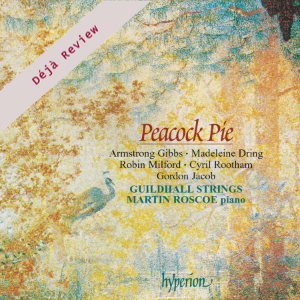
Déjà Review: this review was first published in May 2002 and the recording is still available.
Peacock Pie
Gordon Jacob (1895 – 1984)
Concertino for Piano and Strings (1954)
Cecil Armstrong Gibbs (1889 – 1960)
Concertino Op.103 (1942)
Peacock Pie (1933)
Cyril Rootham (1875 – 1938)
Miniature Suite (1921)
Robin Milford (1903 – 1959)
Concertino in E major (1955)
Madeleine Dring (1923 – 1977)
Festival Scherzo (1951)
Martin Roscoe (piano)
Guildhall Strings/Robert Salter
rec. 2001, Henry Wood Hall, London
Hyperion CDA67316 [60]
Gordon Jacob’s superbly crafted music is still too little-heard nowadays. The present recording of his delightful Concertino for Piano and Strings (1954) is thus most welcome; for, in spite of its brevity, this concise piece has all the Jacob fingerprints: endless melodic and rhythmic invention, colourful scoring and absolute instrumental and formal mastery.
De la Mare’s Peacock Pie has been an important source of inspiration for Howells and Gibbs. The latter set a number of de la Mare’s verse but also collaborated with the poet for Crossings. The short suite Peacock Pie (1933), in three movements each based on a poem from the eponymous collection of verse, is a delightful work brimming with melodic delights. The Concertino Op.103 dates from 1942 and is a somewhat more serious work, but is also full of beautiful moments.
Cyril Rootham’s Miniature Suite (1921) is another highly enjoyable short work with more than a hint of folk-like tunes, and has a beautiful slow movement of some substance. Incidentally, this is its second recording. Richard Hickox recorded it some years ago for EMI (CDC 7 49021 2, maybe still available in EMI’s British Composers series).
It is good also to have some Milford back in the catalogue; for, to the best of my knowledge, Hyperion’s earlier all-Milford LP has never been re-issued in CD format, which is a real pity. The best of Milford’s music compares quite favourably with Finzi’s. His beautifully nostalgic Concertino in E major (1955) is a very fine work full of wonderful tunes.
Madeleine Dring’s superbly crafted music is also conspicuously absent from the catalogue. Her jolly frolicsome Festival Scherzo (1951), sometimes reminiscent of Poulenc in his extrovert Parisian manner, is also a most welcome rarity. It provides for a high-spirited conclusion to this most enjoyable release.
Martin Roscoe and his colleagues obviously enjoy themselves enormously, and their readings of these attractive works are beautifully recorded. Excellent, informative notes by the indefatigable Lewis Foreman.
Light music, I hear someone say? Well, yes, but superbly crafted, tuneful and colourful miniatures that make-up for a most enjoyable programme of rarely heard music. One slight ‘grumble’ though, why was Finzi’s beautiful Eclogue not included? Never mind, though, this delightful release is a joy from first to last, and is unreservedly recommended.
Hubert Culot
Help us financially by purchasing from




















